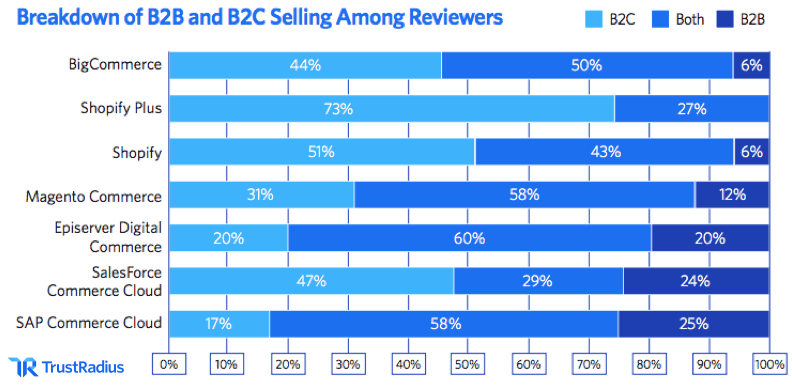Key Differences Between B2B and B2C Ecommerce
Over the past 20 years, the digital economy has been rapidly expanding. It has grown at an average rate of 9.9% per year from 1998 – 2017. And ecommerce, a major part of the digital economy, has grown along with it. According to the Internet Retailer’s analysis of U.S. Commerce Department data, U.S. consumers spent over $5 billion in online purchases in 2018—a 15% increase from 2017. As more individuals and businesses start selling online, choosing an ecommerce solution with the right mix of out-of-the-box functionality and customization becomes increasingly important.
It’s safe to say that ecommerce isn’t going away anytime soon. Especially now that individuals can make online purchases from a range of devices—including computers, tablets, and mobile phones—the percentage of transactions that happen online is likely to continue growing.
Before you start evaluating and selecting a new ecommerce platform, one critical first step is understanding what you’re looking for. There are a handful of key differences between business-to-business (B2B) and business-to-consumer (B2C) selling that, in part, dictate what your next ecommerce software should include. Key dimensions where B2B and B2C online selling differ include:
- buying motivations
- market landscape
- importance of brand reputation
- long-term value vs. immediate cost
- buying process
Elements of B2B Selling
For business selling to other businesses, it’s largely a values game. To justify the purchase to key stakeholders in their own company, customers need to see what type of return on investment (ROI) the purchase will bring. Products and services that have a large price tag can still be rationalized if the expected ROI will outweigh the initial investment. Because of this, B2B selling relies heavily on facts, social proof, peer reviews, and case study examples. Potential customers need to see evidence that the purchase they’re considering has paid off for other businesses in similar circumstances.
The market for B2B sales also looks different than it does for B2C. For starters, the number of buyers in-market is often smaller – though the average order value (AOV) per customer is typically higher than it is for B2C sales.
There are also usually more people involved in the decision-making process than in B2C sales. Our research shows that 95% of purchases were made by buying committees of two or more people. Along with larger buying committees, there’s often a lengthy purchase approval process that accompanies large B2B investments. Based on recent research, we found that the total amount of time it took to purchase a product took longer than one business quarter for 46% of buyers.
Reputation and brand management are also an important part of B2B sales for a couple of different reasons. When businesses decide to make a purchase, it’s because they have a critical need. Along with the product or service they’re buying, they’re also investing in a relationship with the vendor – and this relationship doesn’t end after the purchase is made.
Companies will often need support and advice from the vendor about how to implement and configure their new product, especially if it’s software or hardware. This relationship also serves as the foundation of trust between the customer and the vendor. Trusting that a vendor will make good on their promises to deliver products or services on time, charge an agreed-upon fee, and be available for post-sales support is ultimately what convinces businesses to make a purchase.
Must-Have Features for B2B Ecommerce
If your company primarily sells to other businesses, there are a couple of capabilities you’ll want to make sure your ecommerce platform includes:
- Customizable pricing, payment, and ordering options
- Ability to deeply personalize your online storefront (e.g. branding, site search, and navigation)
- Options for customers to easily reorder the same items and quantities
- Discounted bulk ordering
- Ability to set a minimum order quantity (MOQ)
- Ability to restrict access to certain groups (e.g. allowing only registered customers to view products)
- Ability to segment customers into groups, or integrate with the user’s CRM or ERP software
- A wide range of payment options and a highly secure checkout experience
Elements of B2C Selling
In contrast to B2B selling, selling to consumers is largely a numbers game. Most consumers are interested in buying the best quality product they can find for the cheapest price and are less worried about long-term ROI. Apart from larger investments like houses or cars, the average consumer is much more driven by emotion and impulse than the average B2B buyer. While B2B sales are motivated almost exclusively by the business’s current needs and budget constraints, consumers make purchases based on their wants and desires as well as their needs.
It’s also easier for consumers to make impulse buys because, usually, they’re the only ones involved in the purchase! Unlike business buyers, consumers don’t have to justify their purchase to a committee of people and provide them with information about the expected ROI. In a similar vein, consumer purchases usually don’t involve a purchase approval process because consumers tend to make buying decisions individually. These two aspects of B2C buying generally lead to a much quicker sale.
There is also a larger number of consumers than there are in-market business buyers, however, B2C purchases (excluding long-term investments like property or cars) typically have a lower order value.
While the online shopping experience matters to both B2B and B2C shoppers, there are typically more alternative online retailers for consumers to turn to if they’re having a negative experience with a specific online seller. Giant online retailers like Amazon have been stepping up their customer experience (CX) game by investing in capabilities like personalized product recommendations to help provide better shopping experiences for their customers.
Reputation and brand management often don’t matter as much for B2C brands as they do for B2B companies. Most consumers have lower levels of brand loyalty than business buyers do, and would be happy buying a competitor’s product if they felt they were getting the same quality for a lower price. The exception to this rule, of course, is luxury good brands like Apple.
However, one type of reputation management that is extremely important in both B2B and B2C sales are reviews from fellow buyers. Before making a purchase, whether online or in person, consumers are likely to consult reviews from other buyers first to see if the purchase will be worth it. According to one recent study, 91% of 18-34 year olds now trust online reviews as much as they do personal recommendations, and 57% of consumers will only use a business if it has a 4-star rating or higher.
Essential Features for B2C Ecommerce
If your business will primarily be selling to consumers, here are a few features your ecommerce platform should have:
- Built-in online storefront themes or templates
- Ability to customize product listings and have multiple product variants
- Abandoned cart recovery capabilities
- Promotion and discount code tool
- Built-in SEO tools
- Content management capabilities and blog section
- Secure check-out experience with multiple payment options
Ecommerce Platforms Ideal for B2B and B2C
Now that we’ve walked through the 5 differences between selling to B2B and B2C customers, let’s take a look at which ecommerce platforms are best suited for each type of selling.

There are a few products that are better suited for each type of selling, with a handful of platforms being especially well designed for both B2B and B2C ecommerce. Below is a list of products ideal for each type of commercial selling:
B2B
B2C
Both
If you’re interested in learning more about specific products, check out our ecommerce platforms software page for a comprehensive list of products and verified peer reviews.
Was this helpful?
